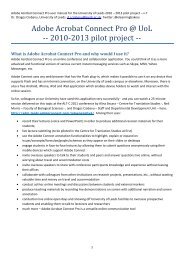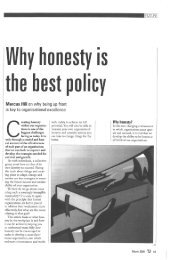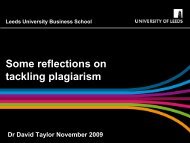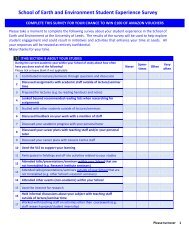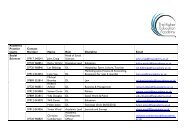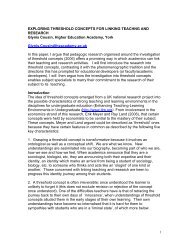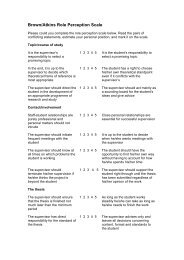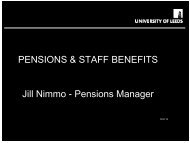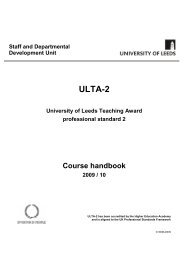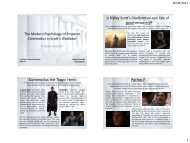Presentation by Dennis McKeown, Psychology
Presentation by Dennis McKeown, Psychology
Presentation by Dennis McKeown, Psychology
You also want an ePaper? Increase the reach of your titles
YUMPU automatically turns print PDFs into web optimized ePapers that Google loves.
Turnitin, policy, procedure, &practice seminarDenis <strong>McKeown</strong>Institute of Psychological SciencesDenis <strong>McKeown</strong> Institute ofPsychological Sciences
Acknowledgements• In <strong>Psychology</strong>• Lesley McGorrigan• Alison Tindall• In Office of Academic Appeals & Regulations• Andrew Brooks• Eileen DickinsonDenis <strong>McKeown</strong> Institute ofPsychological Sciences
Structure• Training students & staff• Turnitin Originality Reports• Consistency, fairness & clarity ofdisciplinary procedures• A word on deterrenceDenis <strong>McKeown</strong> Institute ofPsychological Sciences
Turnitin is the equivalent of dopetesting in cyclingDenis <strong>McKeown</strong> Institute ofPsychological Sciences
Training students• Year meetings at every level ofundergraduate programme• Masters student too• UG & Masters handbook entry onplagiarism & collusion• One assignment originality report viewedYear 1 UG, and <strong>by</strong> new Masters studentsDenis <strong>McKeown</strong> Institute ofPsychological Sciences
Protecting students fromplagiarism• A new concept perhaps, but necessary when reportcan “turn up” 50 % non-original content or more• The originality report can “appear” to providealarming evidence of cheating• Overlap evident especially in group assignments• Giving students confidence in using their own words• Using early Level 1 essays as a training vehicle foravoiding plagiarismDenis <strong>McKeown</strong> Institute ofPsychological Sciences
First and second offences• Minor, first offences may be handled at School level,but all major and second offences are referred to theOffice of Academic Appeals & Regulations (OAAR)• All minor, first offences are reported to OAAR• But first offences are not “minor” in that any futureoffence will potentially lead to expulsion fromUniversity• Yet originality reports “could” be used to bring firstoffence cases in a large number of instancesDenis <strong>McKeown</strong> Institute ofPsychological Sciences
Training staff• Do not confuse introduction of electronicsubmission of coursework with electronic marking• GradeMark offers efficient and consistent feedbackbut may have low take-up and may not be suitablefor very long assignments• Staff who mark an assignment responsible forviewing the originality report• Marking should precede and be “blind to” report %• Overall % in report is not a reliable guideDenis <strong>McKeown</strong> Institute ofPsychological Sciences
Decisions on what anoffence is• Potentially Turnitin originality reports could leadto an expansion of referred cases• Departments need to ensure training ofstudents, ensure awareness of staff, and ensureconsistent standards internally• Decisions on offences may need to be reviewedin light of the great amount of new datagenerated <strong>by</strong> electronic detection softwareDenis <strong>McKeown</strong> Institute ofPsychological Sciences
Turnitin originality reports• Staff need to exercise “normal academic discretion”• Initiative in <strong>Psychology</strong>: We incorporate writtenconfirmation <strong>by</strong> all module leaders that they haveviewed all originality reports into module review• Module review carried out via VLE, and staffcomplete statement that they have viewed andchecked originality reports• (Almost) all assignments now submitted viaVLE/TurnitinDenis <strong>McKeown</strong> Institute ofPsychological Sciences
Consistency, fairness, clarity ofdisciplinary procedures• Setting up of administrative role in departmentAcademic Standards Officer to handle all cases(otherwise either HOD or Director of Teaching)• Secretarial support: files for cases within/linkedto student files, with consistent accurate records• Allowing ease of identifying second offences• Draft letters for standard cases agreed inLearning & Teaching CommitteeDenis <strong>McKeown</strong> Institute ofPsychological Sciences
DRAFT LETTER• Dear **** student• I am writing with regard to your Practical Report for ResearchSkills II, 2009. The marker has reported the view that yourreport, in a number of places, is almost identical with sectionsof a report <strong>by</strong> another student. I refer you to the Universityregulations regarding allegations of plagiarism, which can befound in the Taught Students Handbook athttp://www.leeds.ac.uk/students/handbook/.• I would like to invite you to a meeting on next Wednesdaymorning DATE ****, at **** am room **** in the department todiscuss the matter. It will be attended <strong>by</strong> myself, ****, and ****(Director of Teaching), the Year Tutor, and your personal tutorif available. You are most welcome to bring a friend in supportto the meeting. I attach a copy of your marked-up reporttogether with the other report.• Yours sincerely,Denis <strong>McKeown</strong> Institute ofPsychological Sciences
Fairness• The meeting is not itself a disciplinary event• It should provide a calm and supportiveenvironment allowing the student to explain thecircumstances and provide any mitigation• Strictly avoid informal chat prior to meeting orgiving student at meeting any indication ofpossible outcomes• Avoid unnecessary elaboration, take minutes &reiterate University procedures• Pastoral follow-up (our duty of care)Denis <strong>McKeown</strong> Institute ofPsychological Sciences
The meeting• One of our regulations is that contested cases arereferred to OAAR• BUT, avoid using that as an arm twisting exercise• “If you do not admit to it you will be referred …”• The originality report on the table can look like aweighty mass of evidence• Ensure the student addresses particular worrysomesections, not a percentage or “all this evidence”Denis <strong>McKeown</strong> Institute ofPsychological Sciences
“Actions speak louder thanwords”• Braumoeller & Gaines, 2001 Political sciencestudent• In part 1 assessed any effects of verbal warnings• Either verbal warning or no warning• “The results can only be described asdepressing”• 10 of 78 papers deemed problematic (nowarning)• 9 of 73 papers deemed problematic (warning)Denis <strong>McKeown</strong> Institute ofPsychological Sciences
A word on deterrence• “Software is likely to unearth quite a few cases… (suggest) providing handouts with examplesof proper and improper citation practice, makingstudents aware of University regulations ..”• “Although simply warning students aboutplagiarism seems to have no discernable effect,advertising the use of plagiarism-detectionsoftware seems to concentrate mindswonderfully”• (Braumoeller & Gaines, 2001, p. 838)Denis <strong>McKeown</strong> Institute ofPsychological Sciences
Summary• The originality report generated in Turnitin willproduce a lot of data• “Evidence” will range from carelessness, to poorscholarship, to paraphrasing intermingled withcopying, to deliberate cheating• In <strong>Psychology</strong> we have been among the first toroll out electronic submission of courseworkand detection of plagiarism/collusion• Our experiences are …Denis <strong>McKeown</strong> Institute ofPsychological Sciences
Summary• … generally positive• We will continue to rigorously train our studentsat each level• Staff training is key too in checking theelectronically generated reports• There is every reason to suppose that thedeterrent value of these procedures is strong• Thankyou.Denis <strong>McKeown</strong> Institute ofPsychological Sciences




